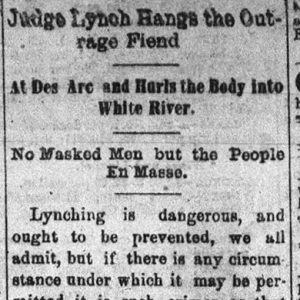calsfoundation@cals.org
Henry Smith (Lynching of)
On July 10, 1881, an African American man named Henry Smith was hanged at Des Arc (Prairie County) for allegedly murdering an orphan girl named Lucinda (Lucy) or Matilda (Mattie) Webb.
According to census records, an eighteen-year-old laborer named Henry Smith was living in the household of farmer William McBee in White River Township in 1880. Reports on the lynching indicate that, in 1881, he was living on the Stallings place. There were two Stallings (or Stallins) families in White River Township at the time, those of fifty-one-year-old Len C. Stallins and thirty-five-year-old J. B. Stallins. There was an orphan girl named Webb in White River Township in 1880, but the census lists her first name as Tennessee. She was living with schoolteacher J. B. Saunders and his family, along with several other pupils. Reports of the lynching indicate that, in 1881, she was living with a Mr. Kelley. The only Kelley/Kelly family in White River Township in 1880 was that of farmer Redio Kelly, who was a neighbor of Len C. Stallings.
Although various sources give different dates for the lynching, it seems to have happened early in the morning on Sunday, July 10. On July 11, the Arkansas Democrat published an account from a traveler notified only as “H.” According to his report, he had been driving from Des Arc to Carlisle (Lonoke County), which was six miles away, when he saw some men and boys standing a short distance from the road. When he inquired, he was told that they had found a child’s body. They reported that on Friday, July 8, a fourteen-year-old girl named Lucinda Webb had started out for school and then was not heard from. The following morning, a man riding on a path through a field near the road discovered her body in some bushes.
In a story the following day, which was later reprinted in the Chicago Tribune, the Democrat reported that the “negro brute” Henry Smith was responsible for attacking the orphan girl, now referred to as Matilda Webb. According to the Democrat, Smith violently attacked Webb, and after “ruining the little thing, [he] cut her throat, stabbed her in the side and bowels, mashed her right shoulder into a jelly, and beat her brains out with a fence rail.” Smith was arrested, and after a coroner’s inquest he was jailed. Around midnight on July 9, a group of thirty to forty unmasked men got the keys to the jail, “pounced upon the monster like avenging angels,” and removed him from custody. He allegedly confessed to his crime. They then hanged him and threw his body into the White River. Other residents who accompanied them to the river made no attempt to stop them. According to the Tribune (using tropes common to lynching articles of the time), “The lynching was the coolest and most quiet piece of business imaginable.…Popular sympathy is with the lynchers.” While the Democrat conceded that lynching was dangerous and should be prevented, it said, “If there is any circumstance under which it may be permitted, it is such crimes as that committed by the Des Arc fiend.”
The following day, the Democrat published an editorial that contradicted its conclusion of the day before: “Another case of mob violence is reported from Des Arc. Such instances are becoming altogether too numerous. A strict enforcement of the law is the remedy for the evil. There is no reason why this should not be done, and every law abiding citizen in the state will regret and deprecate the lynching at Des Arc last Sunday night, as well as all other acts of mob violence throughout the commonwealth.”
For additional information:
H. “The Des Arc Tragedy.” Arkansas Democrat, July 11, 1881, p. 1.
“Personal and General.” Batesville Guard, July 20, 1881, p. 1.
“Popular Vengeance.” Chicago Daily Tribune, July 13, 1881, p. 6.
“So to All.” Arkansas Democrat, July 12, 1881, p. 4.
Untitled editorial. Arkansas Democrat, July 13, 1881, p. 2.
Nancy Snell Griffith
Davidson, North Carolina


 Henry Smith Lynching Article
Henry Smith Lynching Article 



Comments
No comments on this entry yet.